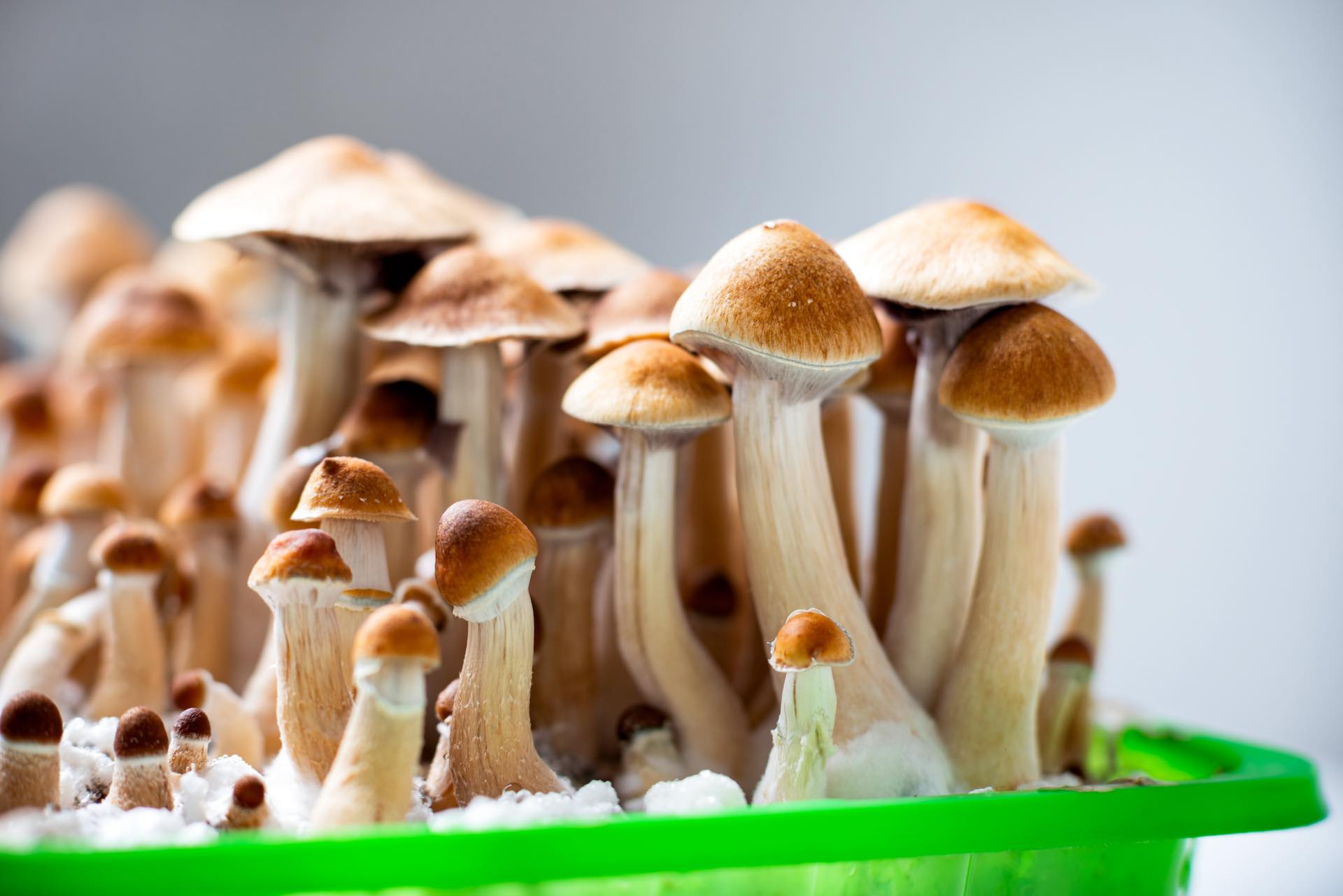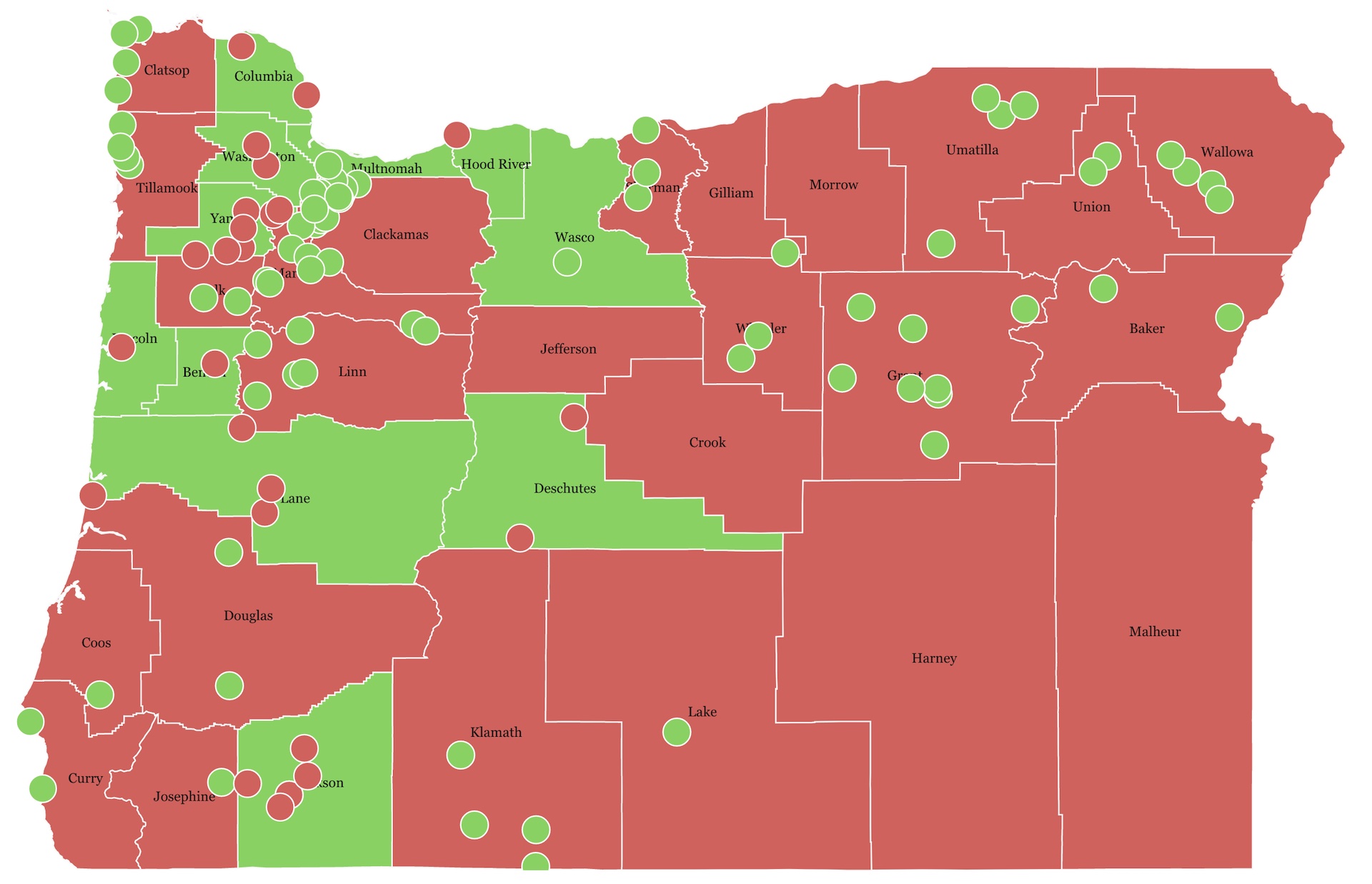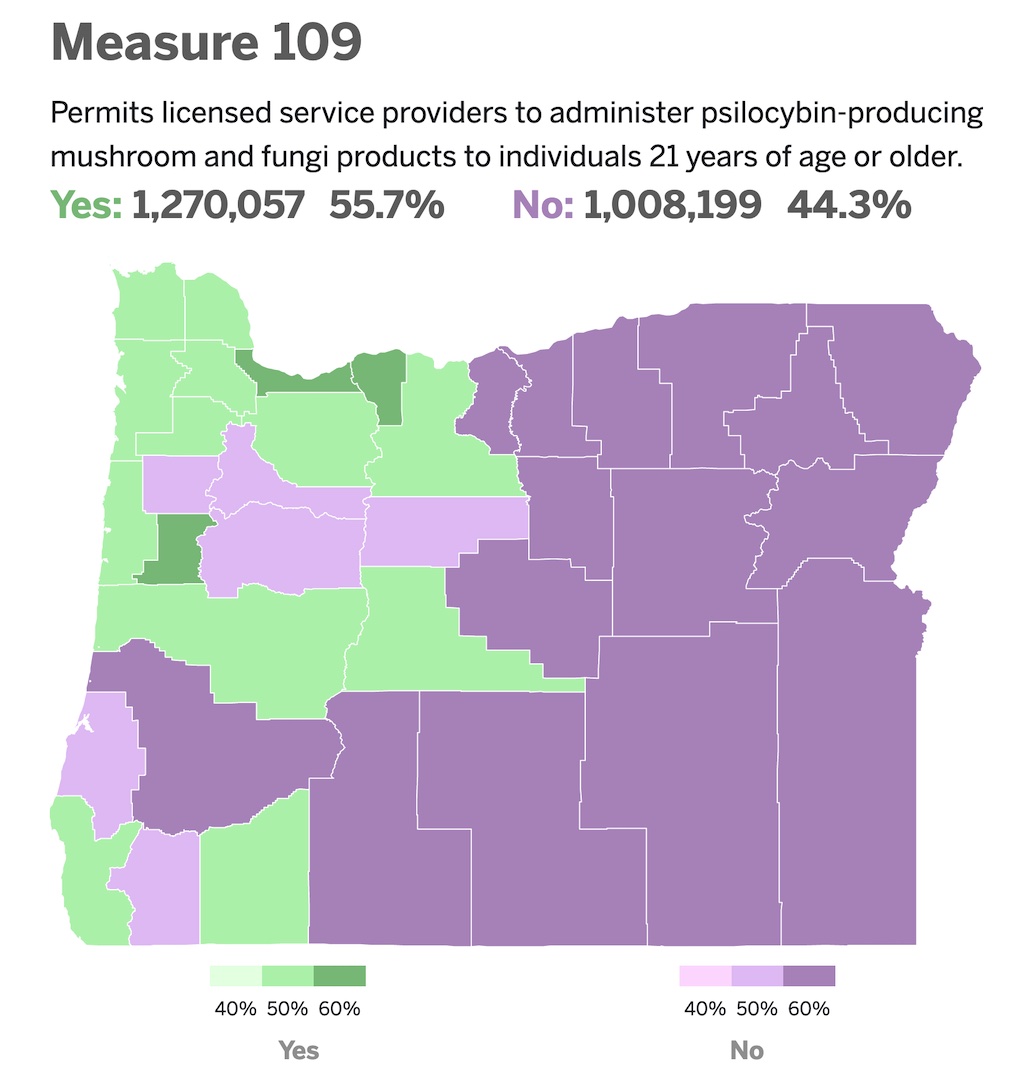
Nearly 70% of Oregon bans psilocybin, but clinics will open next year anyway
In last Tuesday’s election, 25 of Oregon’s 36 counties, along with numerous individual cities, voted to ban the use of psilocybin, the active ingredient in magic mushrooms. These bans come two years after the landmark 2020 vote to allow the use of psilocybin in the state.
The practice of “opting out” is nothing new, it happens all the time with cannabis when laws are passed at the state level regarding adult use of cannabis, but local municipalities then ban the plant in their respective jurisdictions. For example, 62% of counties in California do not allow the sale or possession of cannabis, even though it is legal at the state level. Similar bans on psilocybin are now in place in Oregon following last week’s municipal elections.
But the news is not so grim. Although access to psilocybin is more limited and will become difficult for rural Oregon residents, psilocybin clinics are continuing to operate as planned and are scheduled to open in multiple counties in 2023.
Related
What are Psychedelic Mushrooms and Psilocybin?
Voting results for psilocybin bans
After last week’s election, the legality of psilocybin in Oregon is a messy patchwork quilt. Here’s a map from Psychedelic Alpha’s Psilocybin Tracker showing where psilocybin is legal. (Note: At the time of publication, most Oregon counties had at least one-half to two-thirds of the vote counted, but we think that’s enough to paint a picture of the final landscape of psilocybin legality.)

Psilocybin will only be available in these 11 Oregon counties in 2023:
- Multnomah
- Washington
- roadway
- Jackson
- deschutes
- jamhill
- Benton
- Columbia
- Lincoln
- Wasco
- Hood River
But the picture is more complicated. Aside from county-level bans, there are also city-level bans and sometimes counties that allow it. For example, psilocybin is legal in the unincorporated area of Deschutes County, but the cities of La Pine and Redmond in Deschutes County have banned it. (It remains legal in the city of Bend.) Other cities have banned psilocybin in larger counties that allow it, so it’s important to check if it’s legal in your city.
Even more confusing, if a bit more hopeful, is that some municipalities have voted for temporary bans, usually extending to two years, to give residents time to consider the matter and then vote on whether to see the ban in the 2024 election should be extended.
The above map isn’t very surprising – psilocybin is largely legal in counties with large liberal cities including: Portland (Multnomah) and surrounding counties, as well as Bend (Deschutes), Eugene (Lane), and Ashland (Jackson).
The locations of the opt-out bans aren’t terribly surprising either, given how counties voted for Measure 109 on psilocybin two years ago. All counties that voted against legalizing psilocybin in 2020 have now banned it in their jurisdictions with last week’s vote. (Only 15 counties approved Measure 109 in 2020, which was enough to garner a 55 percent majority to pass the measure at the state level.)
Surprisingly, a few counties passed Measure 109 two years ago but have now banned it: Clackamas, Clatsop, Tillamook, and Curry. Only Jackson and Deschutes counties had opt-out votes and struck them down last week.

Local bans no surprise
The opt-out votes aren’t that surprising to Angela Allbee, manager of the Oregon Psilocybin Services Section (OPS), the agency that sets up and regulates psilocybin laws and clinics for the state.
“We knew this was coming and that these ordinances would be referred to voters in the next statewide election,” Allbee said. “It’s not surprising to know that we’re first in the nation. [We understand] that there needs to be a lot of robust education about the structure of Measure 109.”
The opt-out votes primarily affect Oregonians living outside of the state’s major cities.
“This is a hurdle for people who want access to psilocybin services and live in rural, remote parts of the state,” she said. “The burden is really on the people who want to access services.”
With 69% of the state’s counties opting out, one concern of Oregonians and psychedelics advocates could be: could psilocybin be banned outright in Oregon with local bans?
“It would take quite a change in the law to fundamentally disband this work because it’s already enshrined in law and there’s a lot of interest in it,” Allbee said. “As people learn more about psilocybin and its potential benefits, and as we build trust with communities and really show that we can do this safely and effectively, I think interest will only grow.”
Related
New study shows psilocybin may help with major depression
More education about psilocybin rules is needed
According to Allbee, one of the biggest obstacles to psilocybin being approved in the state and one of the main sources of the opt-out bans is a lack of information or misunderstanding. Many voters seem to assume that buying psilocybin is like visiting a cannabis dispensary – which is not the case at all.
In Oregon’s model, magic mushrooms may only be administered to an adult customer (21 years of age or older) by a licensed facilitator at a licensed service center and only under the facilitator’s supervision during a administration session. Customers must also pass a prep session beforehand and have the option to complete additional integration sessions afterwards to better process the experience.
Oregonians will not be able to go to a store and buy magic mushrooms and take them anywhere they want. This framework differs significantly from cannabis in that psilocybin use is monitored and there is optional post-experience monitoring as well.
Additionally, the Oregon Framework provides licenses for mushroom growers and testing labs to ensure the process is monitored and tracked from spore to consumption. According to Allbee, the focus is on customer experience, customer safety and product safety.
The Oregon Psilocybin Service is a division within the Greater Oregon Health Authority, so the agency approaches the use of psilocybin from a public health standpoint.
“We are building on decades of research and the momentum of current research… much shared knowledge and information from indigenous communities, [and] we share with people who have been practicing in underground spaces for many years,” she said. “We also implement very sound public health thinking and make sure we align with our state’s health goals, which is really important if we’re going to make a difference.”
There are many roadblocks ahead, but Allbee and OPS don’t seem discouraged.
“I think instead of acting with fear, we need to act with curiosity,” she said. “For us, it really means access, equity and trying to work towards affordability, and those are all things that will take time. We are very excited to establish this framework in 2023.”
The public comment period for the Oregon Psilocybin Rules is now November 21st and the rules will be finalized on December 31st. OPS will begin issuing licenses to psilocybin growers, testers, brokers and service centers on January 2nd next year. Service centers are scheduled to open later in 2023.
Visit the OPS website for more information on the psilocybin framework and the public hearings.
Related
Colorado just voted to legalize and decriminalize psychedelics. Here’s what happens next
How is Colorado’s new psilocybin law different?
Colorado voters narrowly passed Prop 122 last week, which will decriminalize psilocybin and many other plant-derived psychedelics and establish psilocybin treatment centers within a few years. Colorado is the second state after Oregon to allow the use of psilocybin in a regulated environment.
The Colorado measure goes further than Oregon’s because it decriminalizes other plant-derived substances like ibogaine, DMT, and mescaline (as long as it’s not derived from peyote). Coloradoans also won’t be able to ban psilocybin treatment centers in their areas like Oregonians have, but they will be able to restrict treatment centers to certain areas.

Post a comment: